About a year ago, the game Wartales came to my attention. A combination of the simulation and strategy RPG genres. As a Strategy RPG fan, I was immediately intrigued. It initially launched in early access and I never really got around to it. However, last month Wartales left early access and launched its 1.0 update. A great time to pick up the game and see what the full game is like. Read on for our Wartales review.
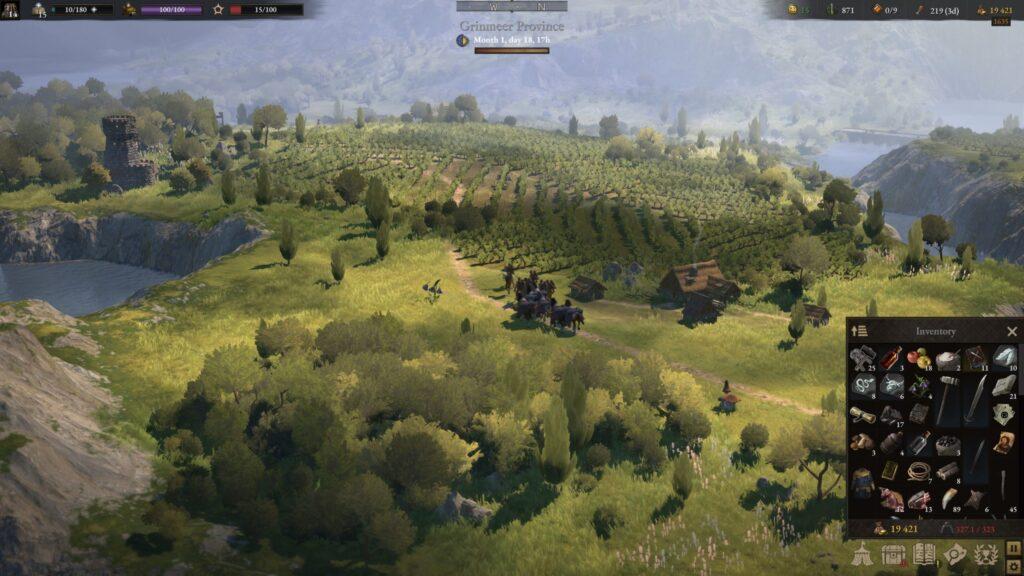
A worthy competitor
Back when Mount & Blade first made waves in 2008, I was sure it was the start of a new sandbox genre. Years later, it seems I was wrong. Sure, there’s been a few games like it but definitely not enough to merit an entire genre. Now, 15 years later, a true competitor has arisen. Its name is Wartales. While the combat is completely different, the feeling and freedom the game offers is very similar.
Wartales is set in a medieval fantasy world. It doesn’t start with a heroic story about saving a kingdom. Your game starts with just a band of unknown mercenaries, dropped in the middle of nowhere. Initially set on a world map, the entire area around you is enveloped in fog of war. It’s up to you to explore the world around you and figure out what to do. In a time where most video games offer hand holding throughout the game, this offers something fresh to say the least. In fact, my first playthrough was all about learning the mechanics instead of making progress.
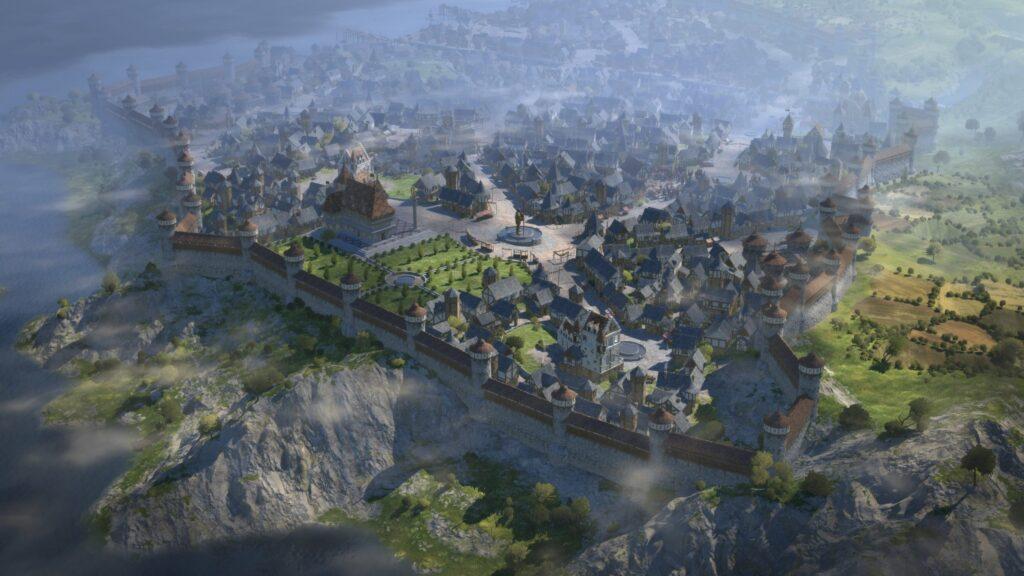
Light on story, full on sandbox
That isn’t to say there isn’t a story at all however. The world is divided into regions all tied to a specific nation or kingdom. Each of these regions has a story to experience, divided over events taking place all over the map. When you resolve all of these events and missions, the regional story is complete. Depending on the playstyle you chose at the start of the game, you’ll be able to move on to the next region. There’s two methods to play Wartales. You can play with or without level scaling. When level scaling is off, it’s recommended to finish your current region before moving on to the next.
The story in the game is definitely not a main focus for the game. It’s very bland and each event offers just a few lines of dialogue. And that is fine in my opinion. Because the game is about shaping your own adventure, not following someone else’s. It’s meant to give you some direction, nothing more. You can choose to ignore it completely if you so wish. Additionally, there are challenges to complete in the game all divided into categories like combat, crafting, trading and so on. While the freedom felt daunting at first, there were plenty of options to give me guidance.
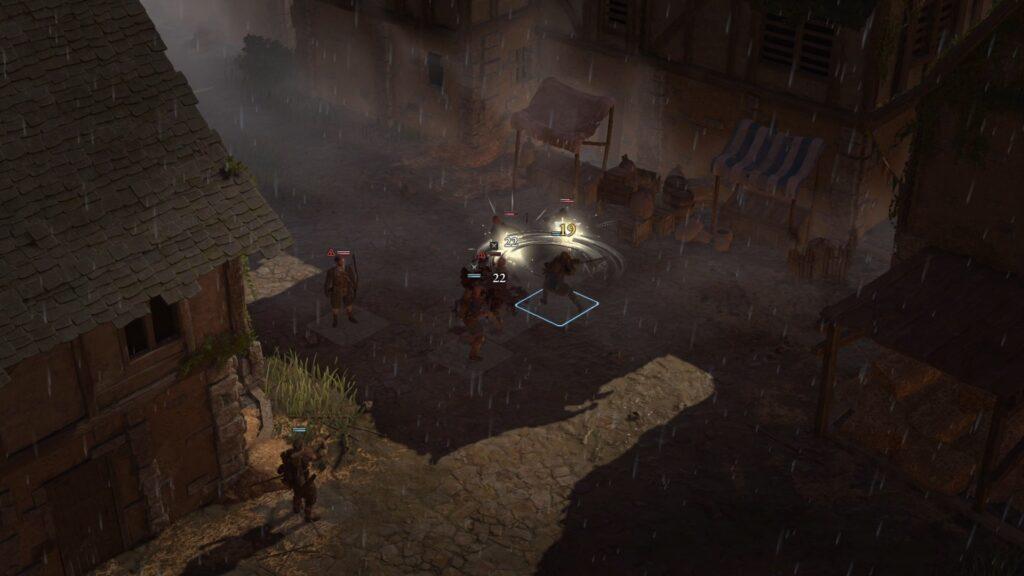
Freedom and exploration
Due to the amount of freedom you get in Wartales initially, in my opinion level scaling is very much recommended. If turned off, you can literally go anywhere and for newer players that doesn’t seem like a great idea. There’s just so much to discover by yourself that it’s fine if it’s a little gated at first. Not to mention, level scaling takes away from the challenge of combat, which I will touch upon later.
Exploration, which is the key gameplay in Wartales, is great. As soon as you’re dropped on the world map, there’s loads to discover. There are roaming bands of NPC’s, both friendly and aggressive. There’s loads of materials you can discover and pick up, such as wood or ore. There’s a lot of locations you can visit as well. From towns, to mines and farmhouses. Each location offers resources and opportunities. One annoyance I had is that it’s sometimes really hard to see what you can pick up. Especially on visit able locations. To make the world even more complex, there’s also various factions. Before long, you’re forced to take sides one way or another. You can even resort to banditry and rob people blind. Of course, this means you’ll become a wanted man with all expected consequences.
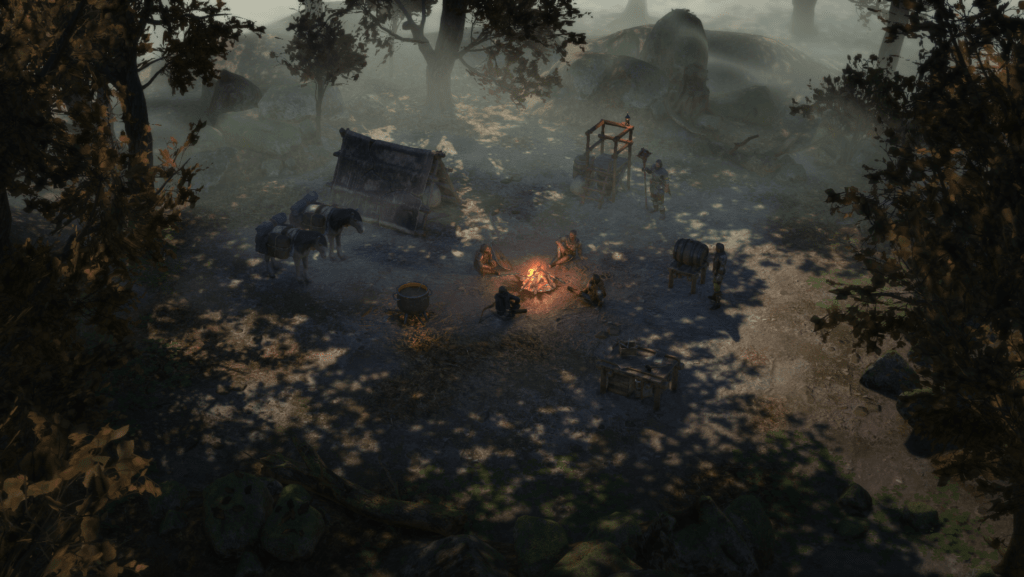
Survival comes first
As you traverse the world map and discover points of interest, you’ll notice time goes by as well. There’s a day and night cycle. During their travels, your mercenary band also tires and needs to rest. You’ll do this at a camp, where you can use your professions for various purposes. Such as cooking and crafting. You’ll need food to survive. If your mercenaries go without food too long, they’ll desert or die. And every few nights, they’ll ask for payment from your gold coffers. As mercenaries befit. I found there to be a proper balance in all this. You needed to make sure you were properly supplied however it didn’t turn into an absolute grindfest. Exactly how I liked it.
While there are multiple supported play styles, such as crafting and trading, eventually you’ll have to dip into combat. When you initiate combat on the world map, you’ll be taken to a separate map where combat plays out turn based. You and the enemy team alternate turns. You can freely choose which unit takes a turn, as long as they haven’t had their turn this round. When every unit had a turn, the round is over. It speaks for itself but is vastly different from Mount & Blade which is action based.
Engage!
Every class offers a different playstyle in combat. There are archers, which deal damage from afar. Spearmen, which allow you to attack from a slight distance so as not to engage targets. There’s also traditional melee classes. Any units who deal melee damage become engaged with their target. Being engaged means you can only deal damage to the engaged target. If you want to run, you’ll need to spend your turn to disengage. There’s also friendly fire in the game. So when archers fire on engaged targets, there’s a chance they’ll hit a friendly. Additionally, as you level up your class unlocks new specific skills as do the weapons they’re equipped with.
Unfortunately, while varied, the combat quickly becomes too easy. Units can die pretty quickly, especially at the start of the game. Units, including your own, are meant to be expendable. You’ll quickly find out you can easily gang up on a target and kill multiple within one turn as your mercenary band grows. The AI doesn’t take advantage of this and often spreads out their units. Eventually, this leads to battles becoming fairly easy.
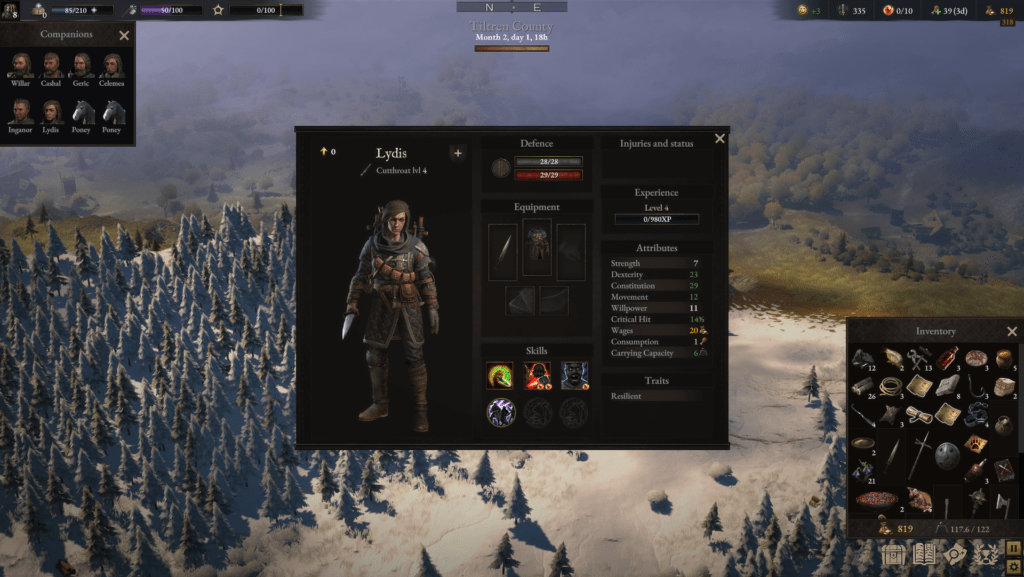
Bring Your Own Mercs
The band of mercenaries you start with is entirely up to you. Once you start the game, you get four randomly generated mercenaries. You can customize their names, their looks, starting weapons and some of their skills. Their classes are predetermined by some background questions you fill in. Your currently equipped weapon also determines what skills and attacks your mercenaries can use. Switching weapons later on, gives you additional or different skills. During the course of the game, you can recruit more mercenaries in taverns which are also randomly generated. Occasionally, there’s some story tied NPC’s you can recruit but this is rare. One thing you’ll need to get used to, is your mercenaries are expendable. They die quickly so don’t get too attached.
In order to grow and equip your army you’ll need plenty of resources. You can scour the world map for resources, find and loot them off enemies or do some randomly generated missions you can pick up from a tavern. Every mercenary can pick up a profession such as mining or blacksmithing. You’ll be able to use the gathered materials to craft a lot of gear yourself. Think of weapons, armor, potions and so on. The way you learn new recipes is handled by a knowledge system, which is a great addition.
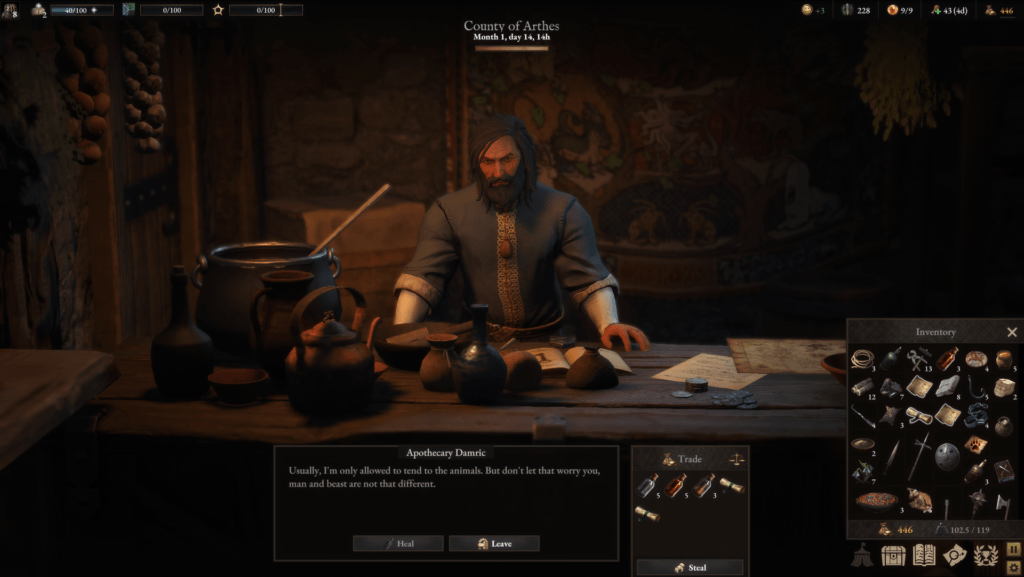
Knowledge is key
While you can learn to craft new items from recipes, most of it is done by spending knowledge points. Knowledge points can be obtained by crafting items for the first time or exploring the world map. When you gain a point, you can unlock new items to create. A great system which rewards experimenting and crafting in a unique way, rather than becoming a simple grind fest.
When I started Wartales for the first time, I did feel a little intimidated by everything there was to discover. There’s no tutorial and you’re left to discover a lot of stuff on your own. But the great news is, this is a lot of fun. Don’t expect your first campaign to last very long. The first hours are all about learning the game mechanics. Even after a dozen or so hours there were new things to discover. It’s a great feeling and it made me realize games should utilize this more often.
At some point, I decided to restart my campaign because I had just learned so much. My second try went a lot better, because you know how to manage your resources so much better. Resources are scarce and you’ll constantly need to evaluate what you need to spend them on. Of course you can grind or trade away for dozens of hours with little progress, but that’s not recommended.
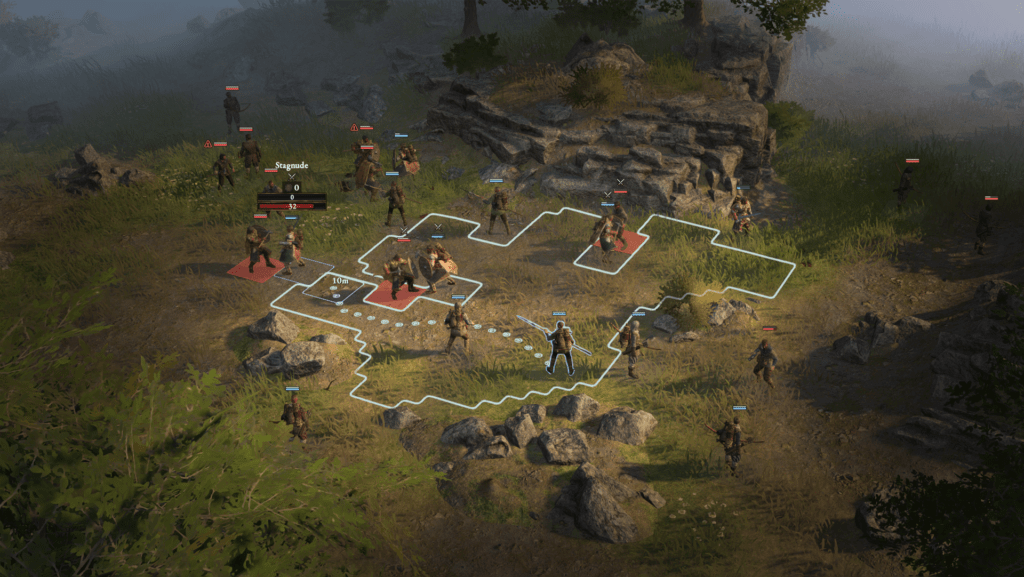
Sprawling landscapes
For an indie game of this scale, the game is also surprisingly beautiful. Not so much in terms of photo realistic graphics, but very much in terms of style. The world map looks very good and is well built. The overlap between environments makes sense and even after zooming in everything is crisp. In terms of animations and character textures, everything looks great for an indie game. The only thing that’s mediocre is the dialogue voice acting. Characters seem a little jaded however it’s not an issue since the story isn’t the main selling point. I was surprised to see the accents were typically medieval however.
While Wartales is a great game with loads of player freedom, one pitfall becomes very apparent after a few hours. Repetitiveness is an issue. The story is pretty thin and after a while you’ll be repeating the same activities over and over. The bigger your army grows, the longer the battles take as well without becoming more exciting. Especially once you figure out how to deal with the enemy AI.
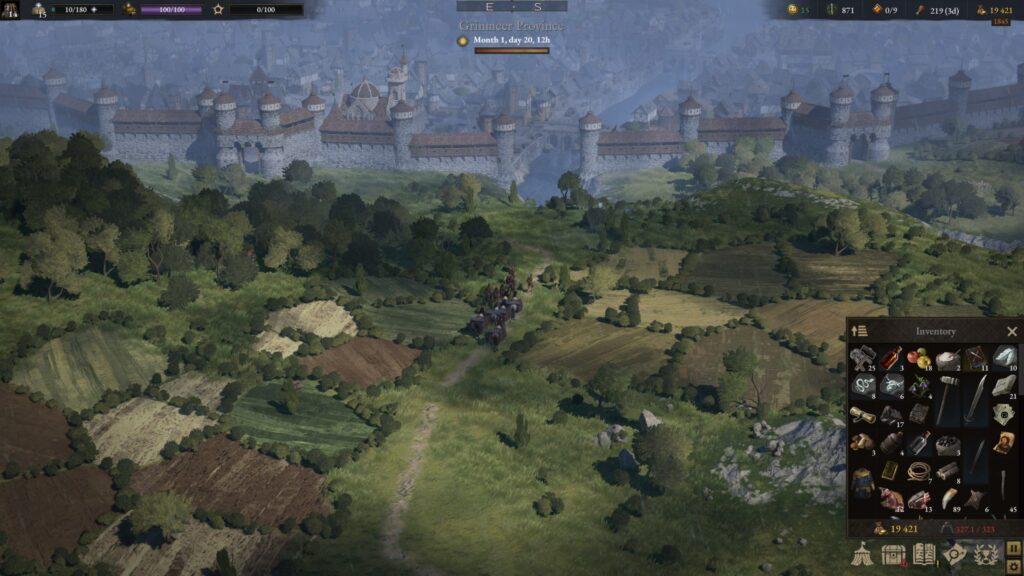
Conclusion
But, if you loved games like Mount & Blade, the aforementioned issues are probably not a big deal. Wartales 1.0 is an achievement the developers can be proud of. A small team delivering a fun sandbox of this scale, with the complexity it offers, is impressive. There’s dozens of hours of fun to be had. And the coolest thing? You can play the game cooperatively with your friends! It’s a game I definitely recommend if you’re into strategy RPGs or sandbox games. If you’re a fan of Mount & Blade, buy it immediately!
Pros:
- Loads of player freedom
- A lot of gameplay options to discover
- Many customization options for your mercenaries
Cons:
- Can become repetitive after a dozen hours
- Interactable objects are hard to see
- Combat AI isn’t great
Grade: 8
That was it for our Wartales review. Be sure to follow us on Twitter to stay up to date with the latest news.
